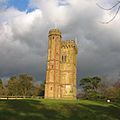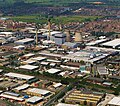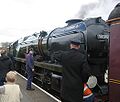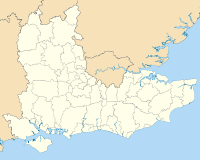The South East England Portal

South East England is one of the nine official regions of England in the United Kingdom at the first level of ITL for statistical purposes. It consists of the nine counties of Berkshire, Buckinghamshire, East Sussex, Hampshire, the Isle of Wight, Kent, Oxfordshire, Surrey and West Sussex. Cities and towns in the region include Aldershot, Ashford, Aylesbury, Basingstoke, Bracknell, Brighton and Hove, Canterbury, Chichester, Crawley, Eastbourne, Farnborough, Gosport, Guildford, Hastings, High Wycombe, Margate, Maidstone, Medway, Milton Keynes, Newport, Oxford, Portsmouth, Ramsgate, Reading, Slough, Southampton, Winchester, Woking and Worthing.
South East England is the third-largest region of England, with a land area of 19,072 square kilometres (7,364 sq mi), and is also the most populous with a total population of 9,379,833 in 2022. The region contains eight legally chartered cities: Brighton and Hove, Canterbury, Chichester, Milton Keynes, Oxford, Portsmouth, Southampton and Winchester. The region's close proximity to London has led to South East England becoming a prosperous economic hub with the largest economy of any region in the UK, after London. The region is home to Gatwick Airport, the UK's second-busiest airport, and Heathrow Airport (the UK's busiest airport) is located adjacent to the region's boundary with Greater London. The coastline along the English Channel provides numerous ferry crossings to mainland Europe.
The region is known for its countryside, which includes two national parks: the New Forest and the South Downs, as well as the North Downs, the Chiltern Hills and part of the Cotswolds. The River Thames flows through the region and its basin is known as the Thames Valley. It is also the location of a number of internationally known places of interest, such as HMS Victory in Portsmouth, Cliveden in Buckinghamshire, Thorpe Park and RHS Wisley in Surrey, Blenheim Palace in Oxfordshire, Windsor Castle in Berkshire, Leeds Castle, the White Cliffs of Dover and Canterbury Cathedral in Kent, Brighton Palace Pier, and Hammerwood Park in East Sussex, and Wakehurst Place in West Sussex. The region has many universities; the University of Oxford is the oldest in the English-speaking world, and ranked among the best in the world.
South East England is host to various sporting events, including the annual Henley Royal Regatta, Royal Ascot and The Derby, and sporting venues include Wentworth Golf Club and Brands Hatch. Some of the events of the 2012 Summer Olympics were held in the south east, including the rowing at Eton Dorney and part of the cycling road race in the Surrey Hills.
In medieval times, South East England included much of the Kingdom of Wessex, which was the precursor to the modern state of England. Winchester was the capital of England after unification of the various states, including the kingdoms of Kent, Sussex and Mercia. Winchester stopped being the administrative capital of England some time in the 13th century as its influence waned while the City of London dominated commerce. The last monarch to be crowned at Winchester was Richard II in 1377, although the last monarch to be crowned by the Bishop of Winchester was Queen Mary I in 1553. (Full article...)
Selected article

Oxfordshire (/ˈɒksfərdʃər, -ʃɪər/ OKS-fərd-shər, -sheer; abbreviated Oxon) is a ceremonial county in South East England. The county is bordered by Northamptonshire and Warwickshire to the north, Buckinghamshire to the east, Berkshire to the south, and Wiltshire and Gloucestershire to the west. The city of Oxford is the largest settlement and county town.
The county is largely rural, with an area of 2,605 km2 (1,006 sq mi) and a population of 691,667. After Oxford (162,100), the largest settlements are Banbury (54,355) and Abingdon-on-Thames (37,931). For local government purposes Oxfordshire is a non-metropolitan county with five districts. The part of the county south of the River Thames, largely corresponding to the Vale of White Horse district, was historically part of Berkshire.
The lowlands in the centre of the county are crossed by the River Thames and its tributaries, the valleys of which are separated by low hills. The south contains parts of the Berkshire Downs and Chiltern Hills, and the north-west includes part of the Cotswolds; all three regions are Areas of Outstanding Natural Beauty. The county's highest point is White Horse Hill (261-metre (856 ft)), part of the Berkshire Downs. (Full article...)
Selected pictures
Selected biography
Roger Harry Daltrey CBE (born 1 March 1944) is an English singer, musician and actor. He is the co-founder and lead singer of the rock band the Who.
Daltrey's hit songs with the Who include "My Generation", "Pinball Wizard", "Won't Get Fooled Again", "Baba O'Riley" and "You Better You Bet". He began a solo career in 1973 while still a member of the Who, and has released ten solo studio albums, five compilation albums and one live album. His solo hits include "Giving It All Away", "Walking the Dog", "Written on the Wind", "Free Me", "Without Your Love" and "Under a Raging Moon".
The Who are considered one of the most influential rock bands of the 20th century and have sold over 100 million records worldwide. As a member of the band, Daltrey received a Lifetime achievement award from the British Phonographic Industry in 1988, and from the Grammy Foundation in 2001. He was inducted into the Rock and Roll Hall of Fame in 1990, and the UK Music Hall of Fame in 2005. He and Pete Townshend received Kennedy Center Honors in 2008, and The George and Ira Gershwin Award for Lifetime Musical Achievement at UCLA on 21 May 2016.
Daltrey was ranked number 61 on Rolling Stone's list of the 100 greatest singers of all time in 2008; Planet Rock listeners voted him rock's fifth-greatest voice in 2009. Daltrey has also been an actor and film producer, with roles in films, theatre, and television. (Full article...)
On This Day in South East England
27 January:
1989: Aviator Sir Thomas Sopwith died in Hampshire aged 101.
Categories
Related portals
WikiProjects
Topics
Associated Wikimedia
The following Wikimedia Foundation sister projects provide more on this subject:
-
Commons
Free media repository -
Wikibooks
Free textbooks and manuals -
Wikidata
Free knowledge base -
Wikinews
Free-content news -
Wikiquote
Collection of quotations -
Wikisource
Free-content library -
Wikiversity
Free learning tools -
Wikivoyage
Free travel guide -
Wiktionary
Dictionary and thesaurus
































































































































